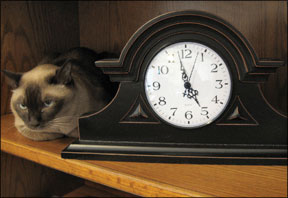You have to get up at 6:00 a.m. during the week. But you dont even have to set your alarm, because your cat comes in and licks your fingers or jumps up and purrs on your chest just before the wake-up hour. Thats a pretty nice way to wake up, actually – unless it happens to be Saturday morning and you were planning on sleeping in. But weekday or weekend, your old-faithful feline is

Bev Caldwell
288
there just the same, licking your fingers and purring on your chest just before 6:00 a.m.
How do cats do it? Do they really sense what hour it is, or is it something else?
Alas, this is one of the many enduring mysteries about cats, says Larry Myers, DVM, PhD, of the Auburn University School of Veterinary Medicine in Alabama. “Some of what appears to be cats telling time is entrainment. Its routine reinforced. Cats very quickly become aware of when human family members wake up, eat, go out and come home,” says Dr. Myers, whose 18-year-old female cat wakes him at 6:00 a.m. daily for breakfast (hers, not his).
In fact, it often seems more likely that our cats are training us than that they innately know what time it is. This is especially true when a cat wants to eat.
“But It wouldnt surprise me if cats had some kind of internal rhythm, says Dr. Myers. “Thats true of other species [such as birds]. However, there hasnt been enough research done on the issue of cats and their sense of time.”
Environmental Cues
We do know, however, that there are lots of cues that cats take from their environment. Sunlight, the song of birds, the jangle of keys in the door lock – all these things let cats know whats happening in the world. Being the intelligent creatures they are, cats respond to these external cues. And when we or something else reinforces these behaviors, cats will often perform them regularly.
“I have a fishing cabin on a lake,” says Dr. Myers. “At very specific times, the frogs come out, the birds come out. My cat starts looking for birds at the bird feeder at certain hours now.”
There are also internal cues that drive cats to do things at certain times. These include hunger, thirst, the need to eliminate and the desire to play or socialize,” says Dr. Myers. Although some of these issues are greater for dogs, they can explain why your cat is so happy to see you when you get home.
But heres something that you may not realize, says Dr. Myers, who has videotaped cats and dogs left without people present. “Your cats, especially, are not really waiting on pins and needles for you to show up at home,” he says. “Yes, they will hear your car in the driveway, your steps on the stairs, your key in the lock and your voice calling them. When they hear you, they will awake from their naps or leave their food bowls to wait near the door for you. But if you dont come home at the same time, they are probably not waiting and waiting for you.”
But that doesnt mean that theyre not happy to see you; they are. And it sure looks like theyve been waiting for you when you open the door and your feline greets you with an eager meow and an affectionate rub.
But cats are probably not telling time the way we do – in measured segments. You can test this the next time your cat wakes you up on the weekend by rolling over for a bit more shuteye instead of getting up. It might be helpful to put out some food before going to bed (dry kibble works best) so that your cat wont think shes starving the next morning. With any luck, you can teach your cat to enjoy sleeping in on weekends, too.



